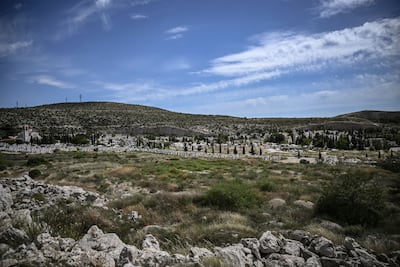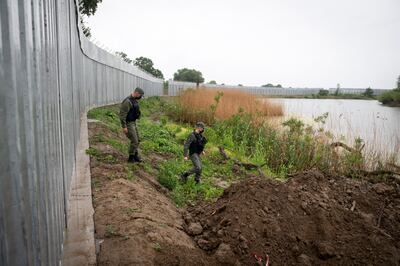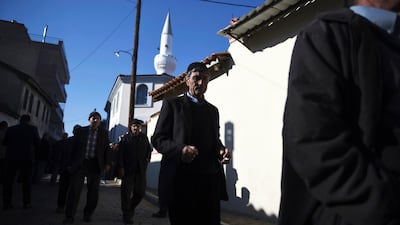Greece has always attached great importance to implementing policies that guarantee three values it holds dear: equality before the law, respect for human rights and religious freedoms, and equality of opportunities for all – including the members of the Muslim minority in Thrace.
Unfortunately, this situation sometimes leads to misunderstandings and misrepresentations of facts.
The National recently published an opinion piece (“Why the Turkey-Greece border area continues to be a site of migrant misery”, dated October 24) about the plight of a number of these migrants. However, the article misinterprets facts on two counts: one pertains to last month’s tragic incident involving migrants in the Greek region of Evros; the other concerns the status of the Muslim minority in Thrace.
Aiming to restore the truth and set the record straight, it is incumbent upon me to bring some facts to the readers’ attention.
The 1923 Treaty of Lausanne established the status of the Muslim minority in Thrace, identifying it on the basis of religion and without reference to the ethnic origin of its members (Turkish, Pomak, and Roma). The provisions of the Treaty are clear and cannot be changed nor distorted.
It is just as clear that the Greek state has adopted measures with the aim of promoting and safeguarding the cultural identity of the Muslim minority in Thrace, as well as facilitating their access to employment in the public sector.
It should also be noted that the members of the minority are EU citizens who enjoy a wide range of minority rights, in addition to the rights and freedoms guaranteed to all Greek citizens without any discrimination.

They actively participate in all aspects of everyday public, civil and political life. In successive parliamentary elections since 1927, members of the minority in Thrace have been elected as MPs. Currently there are three minority MPs in parliament.
The Greek state has also spared no effort to secure the educational rights of minority children. More than 100 schools, as well as two Quranic institutions, operate in Thrace.
Additional steps have been initiated to enable members of the minority, especially women and youth, to benefit from national projects focused on sustaining gender equality, combatting racism and xenophobia, and improving access to employment and inter-cultural dialogue.
Furthermore, more than 240 mosques operate in the region, which is the highest rate of mosques per citizen of Islamic faith in Europe.
The most illuminating example of the favourable policies put in place for the Muslim minority is the new law regarding the muftiates, which provides for the widest possible inclusiveness in the muftis’ selection process.
The article talks about members of the Muslim minority who lost their citizenship. However, it bears mentioning that Greece, which is acutely aware of its international obligations, addressed the matter by reforming its citizenship code in 1998.
As an immediate and direct consequence of this legislation, anyone entitled to regain his or her citizenship may do so by following the relevant administrative procedures provided for by the code.
Before anyone lectures Greece, it should be known that almost nobody from the thousands of people of Greek descent forced to leave Turkey during the 1955 pogrom and 1964 extraditions has ever returned to his or her home.
In fact, while the Muslim minority in Thrace still numbers about 120,000 members, Turkey’s Greek minority numbers less than 3,000 people – down from about 120,000 when the Lausanne treaty was signed almost a hundred years ago.

The numbers speak their own relentless truth and constitute the best proof that Greece follows a policy that promotes peaceful co-existence in Thrace of the Minority within the majority.
As the recent EU statement marking the 30th anniversary of the Declaration of the Rights of Persons Belonging to National or Ethnic, Religious and Linguistic Minorities eloquently puts it: “The EU deeply regrets past discriminatory policies implemented by Turkey, which resulted in the Greek minority currently being on the verge of extinction.” The statement is self-explanatory.
The article also misstates facts regarding the incident involving the 92 migrants on the Evros river.
The migrants, rescued by the Greek police, themselves reported that they were carried to the Turkish side of Evros in Turkish vehicles and were forced to cross it to reach the Greek side. According to their testimonies, they were robbed and subjected to injury at the hands of Turkish authorities. The Greek police immediately informed the European Border and Coast Guard Agency and organised a rescue operation.
This reprehensible incident proves that Turkey continues to use migrants in violation of their human rights.
It is also clear that Ankara refuses to honour its international obligations under the 2016 EU-Turkey Joint Statement.
Greece, on the other hand, will continue to protect the EU’s borders in an effective and timely manner, fulfilling its obligations as a member state of the bloc and the Schengen Area.
Given all this, it is striking that the article omits any reference to migrants being ushered by Turkish authorities towards its land and sea borders. It effectively equates the perpetrator with the victim and distorts the reality on the ground.


